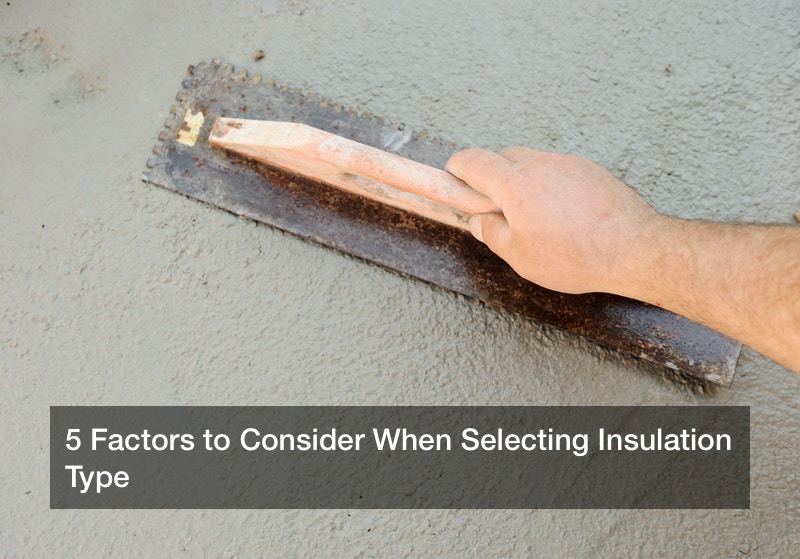
Your heat pump and HVAC system improve the coziness and comfort of your home. So does the home insulation. The insulation provides an envelope of insulating materials that better indoor temperature stability. Insulating your home ensures that ambient heat stays within your home. The insulation reduces heat pump energy consumption and energy costs. This post presents essential factors that you’ll need to consider when choosing the perfect home insulation materials.
Here are five insightful tips on how to select the best home insulation materials for your wall, floor, and roof insulation.
The R-Value or Thermal Conductivity
An ideal insulating material should be capable of retaining heat within confined spaces. It does this by providing a layer with limited thermal conductivity. Perfect insulation materials should have low thermal conductivity.
The R-value of insulation materials determines their thermal conductivity. The R-value value measures the insulation materials’ ability to resist the flow of heat through the insulation layer. The value is an indicator of the insulation material’s quality. When the R-value is high, the thermal conductivity of insulating material is low.
As such, there is less heat loss and less heat pump energy use. As such, you’ll need a shallow depth of insulating material to achieve better thermal performance for your insulation layer. Higher R-values also reduce the energy consumed by your heat pump or HVAC systems.
This property of your insulating material may get measured as the R-value (thermal resistance) or the k-value (thermal conductivity). As a rule of thumb, ideal insulation materials should have a high R-value and a low k-value.
Exposure to Moisture
Most insulation materials are either hydrophobic or hygroscopic. These terms define the behavior of water vapor when it settles on the insulation materials. Hygroscopic insulation material absorbs water and releases it when ambient humidity levels and temperature change. But hydrophobic insulation materials don’t absorb the moisture.
Instead, the moisture condenses into tiny droplets when exposed to hydrophobic insulation materials. Most natural insulation materials such as sheep wool and wood fiberboards can get damaged if exposed to high humidity levels for prolonged periods. As such, these materials aren’t ideal for home areas exposed to high moisture levels.
Flammability
Fires are a significant home hazard. Who wouldn’t get worried about fires? Almost all types of insulation can provide an ideal level of thermal stability for your home’s heat envelope. But some types of home insulation materials are more flammable than others.
You should get worried about the dangers that lurk in your walls, floors, and roofs. It’s thus advisable to choose insulation material that has low levels of flammability. Such materials can impede the spread of fires in case of a fire accident in your home.
Low flammability reduces property damage levels and the severity of injuries. It also reduces the number of casualties in cases of fire breakouts.
Sound Proofing Capacity
A soundproof home or room is ideal if you plan to use your home or a specific place in it as a studio, office, or conference room. As such, choosing an insulation material with excellent soundproofing capacity provides you with an extra advantage. With such materials, you can insulate your home against temperature fluctuations and noise.
Injection foam is an ideal insulation material that has both insulating and soundproofing properties.
Allergens
Insulation materials such as cellulose and fiberglass pose a health threat because they can elicit allergic reactions from home occupants when exposed to them. If your loved ones and friends have allergic reactions, then it’s recommendable to choose insulation materials such as injection foam, which doesn’t have irritants that cause allergic reactions. Liquid injection foam settles to provide a thick layer that doesn’t emit any irritants.
Bottom-Line
Cooling and heating of most average homes consume an estimated 54% of your utility bills every year. Your homes’ insulation material can reduce your heating and cooling energy needs. It can also reduce your energy bills and power consumption for your heat pump or air conditioning systems.
Your heat pump and the HVAC system may also have a long lifespan and high efficiency if you insulate your home well. So, choose the best insulation materials and perform proper insulation installation to get the best results.
More Topics:
2000 square feet house for sale, a great location, acres homes ghetto, amenities to look for when buying a house, buying a home things to know, choosing a house, closest real estate office to my location, comp homes near me, comparable housing prices by area, compare home values neighborhood, comps for homes near me, considerations when buying a house, development property for sale near me, home prices around me, how much does my house increase in value each year, how much house value increase, how much will my house increase in value, how to choose a home to buy, how to choose a house, how to find new housing developments in my area, how to get your dream house.
